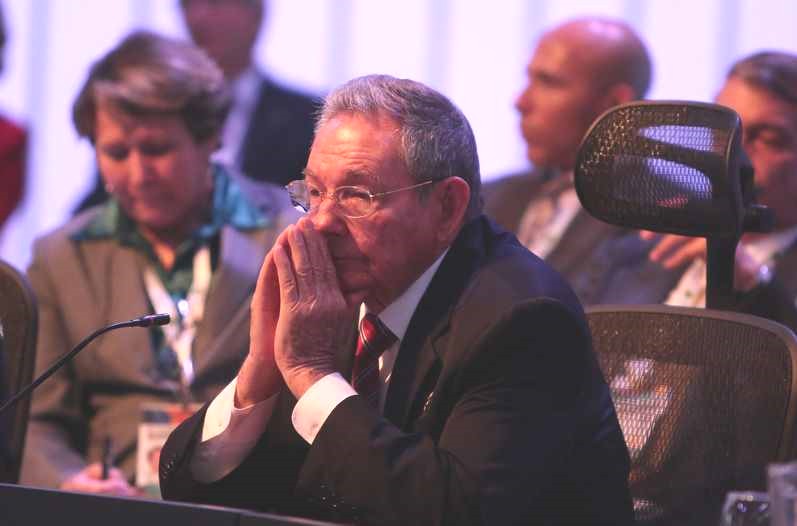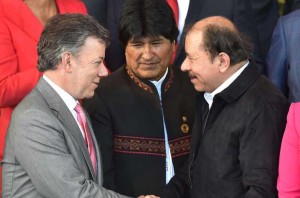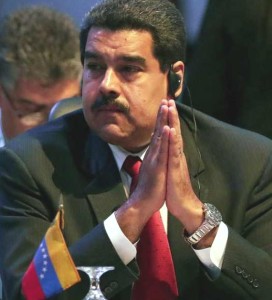
Raúl Castro on U.S.-Cuba relations
Excerpts from the speech delivered Wednesday (Jan. 28) at the CELAC Summit in Costa Rica by Cuban President Raúl Castro Ruz, as translated by Progreso Weekly. The translator’s clarifications appear [in brackets.]
***
Last Dec. 17, […] the President of the United States acknowledged the failure of the policy against Cuba applied for over 50 years, the complete isolation that it brought to his country, and the damage that the blockade causes to our people and ordered a review of the obviously unjustifiable inclusion of the island on the list of Countries Sponsors of International Terrorism.
Also that day, he announced the decision to restore diplomatic relations between the United States and our government.
These changes are the result of nearly a century and a half of heroic struggle and fidelity to the principles of the Cuban people. They were also made possible by the new age in which our region lives and the strong and courageous demands of the governments and peoples of the CELAC.

They have been a vindication for Our America, which acted in close unity for this purpose in the United Nations Organization and in all other areas.
Preceded by the ALBA Summit in Cuman·, Venezuela, the debates held at the 2009 Summit of the Americas in Port of Spain, Trinidad and Tobago, led newly elected President Obama to posit a new beginning with Cuba.
In Cartagena, Colombia, in 2012, there was a hearty discussion with a unanimous and unequivocal approach against the blockade, an occasion that prompted an important North American leader to refer to it as the great failure of Cartagena — “disaster” was the exact word used — and a debate ensued over the exclusion of Cuba from these events.
Ecuador, in protest, had decided not to attend. Venezuela, Nicaragua and Bolivia argued that they would not attend another summit without Cuba and received the support of Brazil, Argentina and Uruguay. The Caribbean Community took the same stance. Mexico and other nations stated the same.
Panamanian President Juan Carlos Varela, before his inauguration, announced with determination that he would invite Cuba, with full rights and equality of conditions, to the Seventh Summit of the Americas and did so. Cuba immediately declared that it would attend.
This demonstrated Martí’s accuracy when he wrote that “a just principle from the depths of a cave, can accomplish more than an army.”
To everyone here present, I express Cuba’s deepest gratitude.
To the 188 States that vote against the blockade at the United Nations, to those who made a similar demand in the [U.N.] General Assembly, summits and international conferences and all popular movements, political parties, parliaments and personalities who mobilized tirelessly to that end, I give my sincere thanks on behalf of the nation.
To the people of the United States who manifested a growing opposition to the policy of blockade and hostility over more than five decades, I also reiterate our gratitude and friendly feelings.
These results demonstrate that governments that have profound differences can find solutions to problems through a respectful dialogue and exchanges based on sovereign equality and reciprocity, for the benefit of their respective nations.
As I have repeatedly stated, Cuba and the United States must learn the art of civilized coexistence, based on respect for the differences between the two governments, and cooperation on issues of common interest that contribute to a solution to the challenges facing the hemisphere and the world.
However, no one should expect that, to do so, Cuba has to renounce its ideals of independence and social justice, or falter in a single principle, or give one millimeter in defense of our national sovereignty.
We shall not allow ourselves to be provoked, nor shall we accept any attempt by others to advise or pressure us on the subject of our internal affairs. We have earned this sovereign right with great sacrifice and at the cost of the greatest risks.
Could diplomatic relations be restored without resuming financial services to the Cuban Interests Section and its Consular Office in Washington, severed as a result of the financial blockade? How to explain the restoration of diplomatic relations without removing Cuba from the list of State Sponsors of International Terrorism? What will, from now on, be the conduct of U.S. diplomats in Havana regarding the observance of the norms established by the International Conventions for Diplomatic and Consular Relations? This is what our delegation told the State Department in last week’s bilateral talks, and more meetings to address these issues are required.
We shared with the President of the United States our willingness to move toward the normalization of bilateral relations after diplomatic relations are restored, which implies adopting mutual measures to improve the climate between the two countries, to solve other outstanding issues and move ahead in our cooperation.
The current situation offers — modestly– an opportunity to the hemisphere to find new and better forms of cooperation suitable for the two Americas. This would solve pressing problems and break new ground.
The Proclamation of Latin America and the Caribbean as a Zone of Peace constitutes an indispensable platform for this, including the recognition that every State has the inalienable right to choose its own political, economic, social and cultural systems, without interference of any kind by another State, which constitutes an indispensable principle of international law.
The main problem has not been solved. The economic, commercial and financial blockade that causes enormous human and economic damage and is a violation of international law, must cease.
I remember the memorandum from Deputy Assistant Secretary [of State Lester] Mallory, in April 1960, which, in the absence of an effective political opposition, proposed creating in Cuba hunger, desperation and suffering so as to provoke the overthrow of the revolutionary government. Now, everything seems to indicate that the objective is to foster an artificial political opposition by economic, political and communications means.
The restoration of diplomatic relations is the beginning of a process toward the normalization of bilateral relations, but this will not be possible as long as the blockade exists, until the territory illegally occupied by the Guantanamo Naval Base is returned, until radio and television broadcasts that violate international norms are halted, and until fair compensation is given to our people for the human and economic damages they have suffered.
It would be neither ethical, fair nor acceptable to ask Cuba for anything in return. If these problems are not solved, this diplomatic rapprochement between Cuba and the United States will not make sense.
Nor can anyone expect Cuba to agree to negotiate the aforementioned issues in exchange for our internal affairs, which are absolutely sovereign.
Progress was made in this recent negotiation because we treated each other with respect, as equals. To move forward, those will have to be the terms.
We have closely followed the announcement of the President of the United States of some executive decisions to amend certain aspects of the embargo.
The measures published are very limited. The ban on credits and on the use of dollars in our international financial transactions remains; the trips by individual Americans under license for the so-called “people to people” exchanges are prohibited, conditioned to subversive purposes and Americans are also prevented from traveling [to Cuba] by sea.
A ban continues on the acquisition in other markets of equipment and technology containing more than 10 percent of U.S. components as well as the importation by the U.S. of goods containing Cuban raw materials, among many other prohibitions.
President Barack Obama could use with determination his broad executive powers to substantially amend the application of the blockade, which is in his hands to do, even without a Congressional decision.
He could allow, in other sectors of the economy, everything that he has authorized in the field of telecommunications with the obvious objective of exerting political influence on Cuba.
[Obama’s] decision to wage a debate with Congress with the aim of lifting the blockade has been significant.
U.S. government spokesmen have clearly specified that the methods are changing, but not the policy objectives, and they insist on acts of interference in our internal affairs that we will not accept. Our U.S. counterparts should not endeavor to relate with Cuban society as if a sovereign government did not exist in Cuba.
Nobody should dream that the new policy being announced affects the existence of a socialist revolution 90 miles from Florida.
A request has been made that the so-called civilian society be present at the Summit of the Americas in Panama and that is something that Cuba has always shared. We protest what happened at the Conference of the World Trade Organization in Seattle, in the Summits of the Americas in Miami and Quebec, at the Summit on Climate Change in Copenhagen, or whenever the G7 or the International Monetary Fund meets, where [civilians] were placed behind steel fences under a brutal police repression, kept tens of kilometers away from the events.
Of course the Cuban civilian society will attend, and I hope that no restrictions will be imposed on non-governmental organizations, which obviously have no interest in having any status in the Organization of American States but are recognized by the United Nations Organization.
I hope to see in Panama popular movements and NGOs that advocate nuclear disarmament, environmentalists, people who oppose neoliberalism, the Occupy Wall Street and The Angry Ones of this region, university and high school students, farmers, unionists, indigenous communities, organizations that oppose the pollution caused by schist, advocates for the rights of immigrants, organizations that denounce torture, extrajudicial killings, police brutality and racist practices, organizations that demand equal pay for equal work for women, that demand reparations for damage from the transnational companies.

However, the announcements made on Dec. 17 have attracted worldwide recognition and President Obama has received broad support for it in his country.
Some forces in the United States will try to abort this nascent process. They are the same enemies of a just relationship between the United States and Latin America and the Caribbean, they are those who hinder bilateral relations of many countries of our region with that nation. They are those who always blackmail and pressure.
We know that the lifting of the blockade will be a long and difficult road that will require the support, mobilization and resolute action of all people of good will in the United States and the world; the approval by the United Nations General Assembly at its next session of the resolution calling for its end, and, most notably, the concerted action of Our America.
Esteemed Heads of State and Government:
Esteemed friends:
We congratulate Costa Rica, President [Luis Guillermo] Solis and his government for the work performed at the head of the CELAC. We welcome and will fully support Ecuador and President [Rafael] Correa, who will chair the Community in 2015.
Thank you very much.


